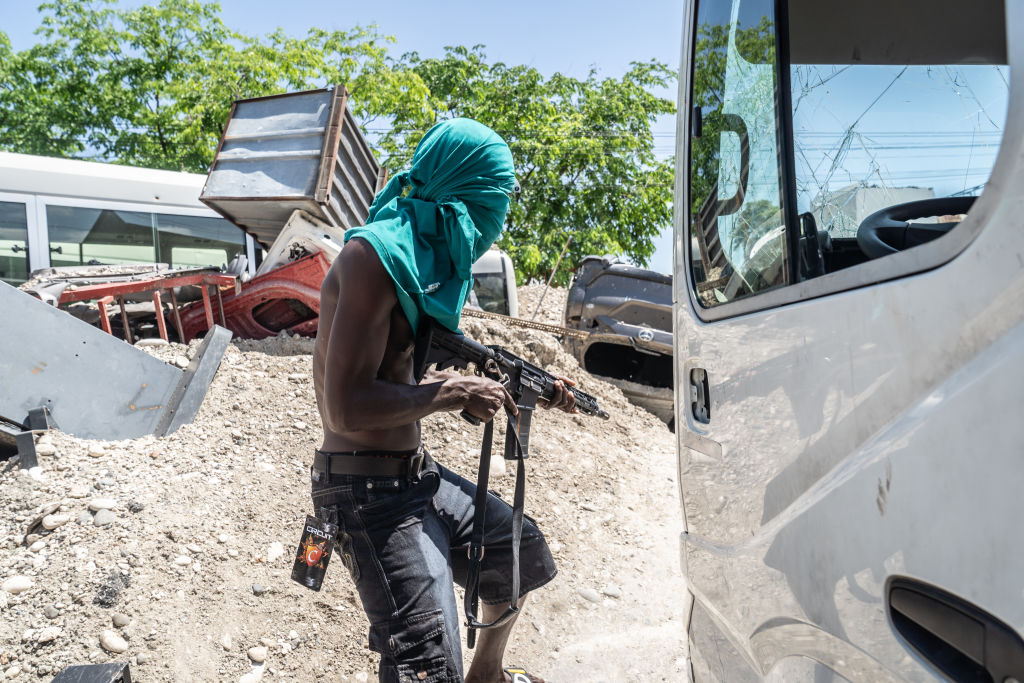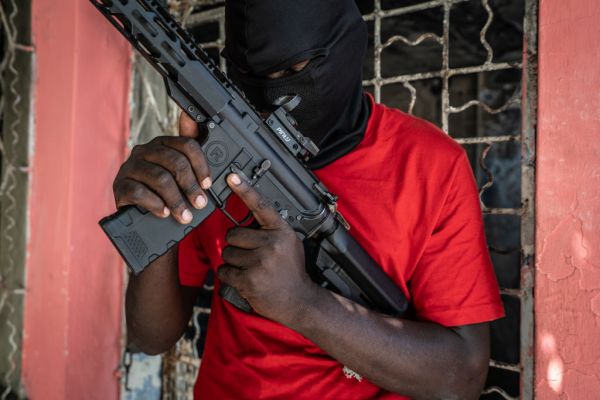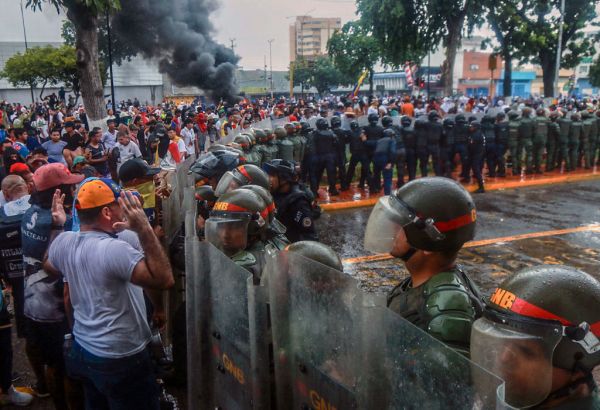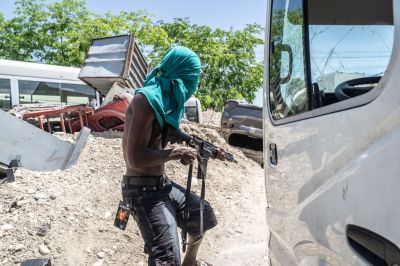Happy Thursday! The Google artificial intelligence (AI) image generator that, as the New York Times put it, “was unable to reliably create images of white people” is back, baby. Google claims Gemini is fixed, but only time will tell whether it’s able to offer historically accurate images of the Founding Fathers and/or the Pope.
Quick Hits: Today’s Top Stories
- The Israel Defense Forces (IDF) launched raids in the West Bank overnight on Tuesday, confirming on Wednesday seven Hamas militant fighters were killed in airstrikes on two West Bank cities—Jenin and Tulkarm—and in the area of the Far’a refugee camp. The IDF said the strike on the camp was aimed at eliminating “armed terrorists that posed a threat to the forces,” adding it arrested five suspected terrorists. Hamas officials claimed that ten people were killed in the West Bank air strikes. The operation was among the largest in the West Bank in months.
- The Biden administration on Wednesday sanctioned an Israeli non-governmental organization (NGO), Hashomer Yosh, and a civilian security coordinator, Yitzhak Levi Filant, for their alleged support for extremist violence by settlers in the West Bank. The State Department said the Israeli NGO provided support to an illegal West Bank outpost, Meitarim Farm, and prevented 250 Palestinian civilians from returning to a village from which the outpost had evicted them in January. Meanwhile, the State Department accused Filant of leading attacks earlier this year on Palestinian civilians and evicting them from their land and property.
- Pentagon Press Secretary Air Force Maj. Gen. Pat Ryder said on Tuesday that the Greek-flagged and owned commercial oil tanker that Iran-backed Houthi terrorists attacked and set on fire last week is believed to be leaking oil into the Red Sea. “The [Greek oil vessel] now sits immobilized in the Red Sea, where it is currently on fire and appears to be leaking oil, presenting both a navigational hazard and a potential environmental catastrophe,” Ryder told reporters. “These are simply reckless acts of terrorism which continue to destabilize global and regional commerce, put the lives of innocent civilian mariners at risk, and imperil the vibrant maritime ecosystem in the Red Sea and Gulf of Aden—their own backyard.”
- Local Ukrainian officials reported yesterday that Russian airstrikes near the front lines in eastern Ukrainian Donetsk oblast killed at least six civilians on Wednesday, the third successive day of such attacks. The Donetsk Prosecutor General’s office reported that among the casualties was a Ukrainian family of four—two parents and their two children—who were killed after an aerial bomb struck their home. Ukrainian President Volodymyr Zelensky also reported on Wednesday that a Russian-guided bomb struck a city center in Kupiansk, located in the country’s northeastern Kharkiv Oblast region, killing a number of people.
- Bloomberg reported on Wednesday that the United Nations National Food Programme is investigating several staff members working in Sudan for possible fraudulent behavior, including violating humanitarian neutrality laws. The ongoing Sudanese civil war—a 16-month conflict between the Sudanese Armed Forces (SAF) and Rapid Support Forces (RSF), a paramilitary group—has left more than 750,000 civilians in catastrophic famine conditions, per the U.N.-sanctioned Integrated Food Security Phase Classification system.
- Leaders of several Pacific Island nations announced their support at the Pacific Islands Forum on Wednesday for a multinational, Australia-funded regional police system in an effort to block further involvement from China, which had sought to expand its role in policing the islands. Officially dubbed the Pacific Policing Initiative, Australia will contribute $271 million toward projects, including four new police training centers and the creation of regional police units.
- French authorities on Wednesday charged Pavel Durov, co-founder and CEO of the popular messaging service Telegram, related to alleged criminal activity on his app. The preliminary indictment focuses on allegations of trafficking in child pornography and drug trafficking through the site, as well as other charges. Durov was first detained on Saturday when his private jet landed in an airport outside Paris, after French prosecutors investigated alleged complicity in illegal activity on Telegram’s privacy-focused, instant-messaging platform. French prosecutors set a 5 million Euro bond and required Durov to check in with French authorities twice per week ahead of a potential trial.
- An FBI official told reporters on Wednesday the agency is currently unable to identify a motive for the gunman who attempted to assassinate former President Donald Trump last month at a Pennsylvania rally. Investigators noted, however, that the shooter had searched online for major campaign events for both Trump and President Joe Biden and reportedly identified Trump’s July 13 rally in Butler County, Pennsylvania, as a “target of opportunity.” The agency added that the would-be assassin had researched bomb-making designs online and said that the components of explosive devices found in his car were all purchased legally.
- Deputy CIA director David Cohen said Wednesday that the CIA had alerted Austrian authorities about the plotted ISIS attack on the Taylor Swift concert in Vienna, Austria, earlier this month, giving local officials time to thwart the terrorist attack before it could be carried out. “They were plotting to kill a huge number, tens of thousands of people at this concert, I am sure many Americans,” Cohen said at a conference. “The Austrians were able to make those arrests because the agency and our partners in the intelligence community provided them information about what this ISIS-connected group was planning to do.”
- The Supreme Court on Wednesday issued an unsigned emergency ruling upholding a federal appeals court’s decision temporarily blocking the implementation of a Biden administration proposal to “cancel” vast amounts of federal student debt. Known as the “Saving on a Valuable Education”* (SAVE) plan—proposed after the Supreme Court rejected an earlier, more costly student debt forgiveness order—the policy change would have, according to the White House, transferred approximately $115 billion in student loan debt from individual borrowers to American taxpayers. However, the SAVE plan quickly faced legal challenges from Republican attorneys general and was temporarily barred from implementation by a federal appeal court last month, leading the Biden administration to request an emergency ruling from the Supreme Court. The program will now remain blocked until the lower court issues a final decision, which the justices encouraged them to do “with appropriate dispatch.”
- The online consumer review company Yelp sued Google on Wednesday, alleging that Google engaged in illegal anticompetitive behavior in the search engine industry by steering users towards its own search results rather than market alternatives from its competitors. The complaint cites a federal district judge’s ruling last month that found Google had monopolized the search engine industry. “Unwilling to invest or innovate to attract users in a competitive environment, Google has instead relied on a simple but effective strategy,” the lawsuit alleges. “It uses its monopoly power in general search to make sure that users never get to local search competitors in the first instance, diverting traffic away from those rivals and toward Google’s own inferior local search product.” A Google spokesman said the company will “vigorously defend [itself] against Yelp’s meritless claims.”
Kenyan Police Battle Gangs in Haiti

Last week marked the anniversary of the Haitian Revolution, when the Caribbean nation won independence from France after a successful slave revolt. More than two centuries of often troubled history later, Haiti is trying to win its freedom from gang violence and chaos that has paralyzed the country since the 2021 assassination of President Jovenel Moïse.
The Haitian National Police (HNP) and part of a U.N.-sanctioned force led by Kenyan police officers battled with criminal groups on Tuesday near some of the gang-controlled neighborhoods of Port-au-Prince. The operation was the first major joint effort of the police and the long-delayed international force that began arriving in June but has struggled to make significant progress against gangs that still control most of the capital. Only a small fraction of the promised force has made it to Haiti, leaving Haitians frustrated as the country still teeters on the brink.
The security situation in Haiti took a turn for the worse this spring when then-acting Prime Minister Ariel Henry was outside of the country for international meetings regarding the crisis. Gangs attacked public infrastructure in Port-au-Prince, including the airport, carried out a huge jailbreak, and took control of government buildings and police installations. Amid the chaos, Henry agreed to step down following pressure from regional actors, and a transitional council of political and civil society stakeholders in May selected Garry Conille, a former prime minister and UNICEF official, to lead the country.
One of Conille’s first moves was to replace the head of the Haitian National Police (HNP). But despite the leadership change, gangs still outman and outgun the police and maintain control of much of the capital. Secretary of State Antony Blinken said in May that the country was “on the precipice of becoming an all-out failed state.” At the Henry government’s request, the international community and the U.S. had settled on an intervention plan to restore order led by Kenya.
As we explained in May:
Kenya first offered to dispatch nearly 1,000 police last July, and the U.N. Security Council authorized the deployment of a “Multinational Security Support Mission” (MSS) led by Kenya last October. The Haiti mission is U.N.-sanctioned, but it is not a U.N. peacekeeping force, in contrast to previous interventions in Haiti. The West African nation of Benin promised to contribute 1,500 trained personnel to the mission, and several other countries—including Jamaica, the Bahamas, and Barbados—have offered smaller numbers of troops and police.
“I want no one to doubt the purpose of the mission,” Conille said in June as the first batch of Kenyan police arrived in Haiti. “The state will regain power and reaffirm its authority so all Haitians can live peacefully in this country.”
But two months later, Conille acknowledged the lack of progress. “The circumstances of Port-au-Prince and, more generally, Haiti, have not evolved much,” he said earlier this month. “We’re still very much hostage to these thugs. Eighty to 85 percent of the capital is still very much under their control.” He added, “We’re doing our very, very best to put in place the systems to be able to respond and answer to the needs of the Haitian people who have been incredibly patient for us to actually meet their expectations.”
The U.S. has provided much of the funding and nearly all of the logistical support for the MSS, including building and securing the base out of which the Kenyan police operate. But the Biden administration has shot down any talk of U.S. troops intervening in Haiti, partly due to the optics. “There’s a lot going on in this hemisphere,” Biden said in May, “and we’re in a situation where we want to do all we can without us looking like America, once again, is stepping over and deciding this is what must be done.”
But if you were paying attention to the behind-the-scenes machinations or simply watching the planes landing in Port-au-Prince, you could tell that the MSS is “U.S.-designed, funded, and planned,” said Jake Johnston, a senior research associate at the Center for Economic and Policy Research focused on Haiti. The U.S. has provided armored vehicles—MRAPs—to the police force, including an additional 24 that were announced on Friday. But the omission of gun turrets in the first batch of MRAPs called into question the level of U.S. tactical involvement in the MSS and HNP operations: U.S. Southern Command said American contractors—who currently secure the base for the Kenyan force—will install turrets on the full fleet of MRAPs once they arrive in Port-au-Prince.
Expecting the MSS to quell the gang violence in short order may always have been unrealistic—and even more so now, given the limited size of the police force currently on the ground. Some 400 Kenyan police officers are in Haiti right now—fewer than half of the planned 1,000. The MSS proposal called for a total of at least 2,500 troops to reinforce and strengthen the Haitian police—Haiti does not have a military—but it’s unclear when the remaining forces will arrive. “It’s coming in too slow and people are growing impatient,” Conille said in August, referring to the international assistance.
But even with less than a sixth of the expected force on the ground, there have been some positive developments, William O’Neill—an independent human rights expert on Haiti appointed by the U.N. Human Rights Council—told TMD. O’Neill, who assisted in establishing the HNP in 1995, said the MSS and the HNP have been able to make some small but significant gains. “The downtown part of the city, which was pretty much run by gangs, isn’t anymore,” he said. The Kenyan police said they’ve secured “critical infrastructure,” including the main airport, and “opened critical roads that have enabled the return of thousands of Haitians earlier displaced.”
Violence also seems to have decreased between April and June, when, according to the U.N., 1,379 people were killed or injured by gang violence. Though large, that figure still represents a 45 percent decrease from the preceding three months. But gangs continue to terrorize many communities in and around Port-au-Prince. The Armed Conflict Location and Event Data Project reported in August that the number of incidents where civilians were targeted declined during the first six months of this year compared to the previous six months, but the total number of reported deaths was similar.
A challenge for the MSS and the HNP has been the shifting centers of violence. As the government has taken control of some of downtown Port-au-Prince, the gangs have pushed out to the perimeter of the city and surrounding towns, areas that security forces can’t hold.
The HNP and the MSS responded to a gang attack in late July on Ganthier, a town 25 miles east of the capital, but the criminal groups simply left before the police arrived—and returned soon after they left. O’Neill said that with more manpower, the police should eventually be able to take and hold more territory. “The hope is that with bigger numbers and more capacity, the Haitian National Police, with the support of the internationals, will be able to expand their areas of operation and effectively go after the gangs wherever they are,” he said.
Even if the MSS and HNP do manage to stem the violence, Haiti’s government—long plagued by mismanagement and corruption—will face a challenging road ahead. The U.S. Treasury Department announced sanctions last week against former Haitian President Michel Martelly over alleged drug trafficking and supporting Haitian gangs, and news of a bribery scandal allegedly involving three of the seven members of the Transitional Presidential Council broke late last month. “Even if they get way more troops, way more resources, the reality is that this is not something that can be addressed by security alone,” Johnston told TMD, citing the lack of trust of the Haitian people in civil institutions.
“If they’re bogged down in [scandal], then they’re not going to be proactively restoring trust in governance,” he said, “because it just looks like more of the same.”
Worth Your Time
- For the Washington Post, David Ignatius spoke to former Republican Rep. Mike Gallagher of Wisconsin about his decision to resign from Congress in April. “The story turns on a gruesome moment the night of Dec. 30, 2023, in Gallagher’s hometown of Green Bay,” Ignatius wrote. “The local sheriff had received an anonymous call claiming that Gallagher had been shot in the face and that his wife and two young daughters, 3 and 1, had been taken hostage. A SWAT team arrived at the house to find Gallagher and his family safe. His anguished wife, Anne, somehow had the presence of mind to ask the SWAT team to take their shoes off before they searched the home. But for the young couple, trying to build a family in the town where they were born and raised, the cruel hoax was a deeply upsetting event. For Gallagher, it proved to be a breaking point. … ‘I signed up for this, but my family didn’t,’ he told me in one of a series of interviews. ‘That was a moment when we felt we needed to make a change and take a step back from politics.’”
- Young children generally find playtime to be the highlight of their day—and schools would be wise to bear that in mind. Writing for Jonathan Haidt’s After Babel Substack, public school teacher Kevin Stinehart explored the importance of childhood free play. “Much of life’s most important content may be taught in a classroom,” he argued. “But life’s most important skills are acquired naturally through unstructured time with peers. Dr. Stuart Brown, a psychiatrist who has spent decades researching play, has concluded that ‘The presence or absence of play, particularly in child development, has a great deal to do with competency, resiliency, [and] emotional health. … Play is not ‘frivolous.’”
Presented Without Comment
Robert F. Kennedy Jr., speaking with TMZ about the reaction of his wife—actress Cheryl Hines—to his recent endorsement of former President Donald Trump:
I would say that Cheryl’s reaction was the opposite of encouraging. … She did attend a meeting—a subsequent meeting with President Trump. She attended that meeting mainly to make sure there were no hasty decisions made at it. This is a really difficult issue for Cheryl. This is the opposite of what she would want to do. She went along with it because she loves me and wanted to be supportive of me, but it was not something she ever encouraged. I would say it was, her trepidation about this and her discomfort with this was, I would say, were the dominant feelings. … She’s a lifelong Democrat, and the idea of me supporting Donald Trump as president was just, like I said, it’s something that she would have never imagined, that she never wanted in her life, that, I think, causes her a lot of discomfort.
Also Presented Without Comment
NBC News: [J.D.] Vance Opens Up On Running With Trump: ‘We’re Each Trying To Talk To Different People In Different Ways’
In the Zeitgeist
We’re about to embark on the first college football season without Nick Saban on the sidelines in decades, but we’re glad to see the longtime head coach is keeping busy in retirement doing … Vrbo commercials.
Toeing the Company Line
- In the newsletters: The Dispatch Politics team explained why Democrats might not be all that devastated by Kennedy’s endorsement of Trump, Scott emphasized why (🔒) government regulatory solutions often cause more trouble than the market problems they seek to correct, Jonah went on an extended riff (🔒) kicked off by some signs he saw from the road, and Nick explored (🔒) the bizarre Trump coalition that somehow includes both Tulsi Gabbard and Nikki Haley.
- On the podcasts: Sarah and David are joined on today’s episode of Advisory Opinions by Yuval Levin to discuss his new book on the Constitution and Mike Warren fills in for Jonah on The Remnant, speaking with Semafor’s Dave Weigel.
- On the site: Joe Pitts writes about masculinity in an age of individualism and the importance of civil society.
Let Us Know
Should the U.S. intervene more forcefully in Haiti?
Correction, August 29, 2024: The Biden administration’s student debt cancellation initiative is called the “Saving on a Valuable Education” plan, not the“Saving on a Value Education” plan.









Please note that we at The Dispatch hold ourselves, our work, and our commenters to a higher standard than other places on the internet. We welcome comments that foster genuine debate or discussion—including comments critical of us or our work—but responses that include ad hominem attacks on fellow Dispatch members or are intended to stoke fear and anger may be moderated.
With your membership, you only have the ability to comment on The Morning Dispatch articles. Consider upgrading to join the conversation everywhere.